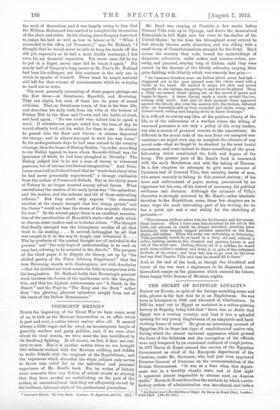INSURGENT MEXICO.*
SINCE the beginning of the Great War we have come, most of us, to look on the Mexican insurrection as an affair which is past and over, a rather trivial matter after all. It seemed always a little vague and far away, an inconsequent tangle of guerrilla warfare and party politics; and, if we were clear about its rival armies, we were none the less bewildered by its desultory fighting. At all events, we feel, it does not con- cern us now. But it is another matter when we are brought into intimate contact with the Mexican soldiery, and bidden to make friends with the roughest of the Republicans ; and the vagueness which shrouded the whole subject only serves to throw into relief for us the individual and personal experience of Mr. Reed's book. For he writes of history more romantic than any fiction, of actual events so stirring that they have needed no embellishing on the part of the author, so unconventional that they are adequately served by the brilliant, informal style of. his professional journalism. .
• Insurgent Mexico. By John. Reed. Lcraou : D. Appleton sad Co. LUG.]
Mr. Reed was staying at Presidio a few weeks before General Villa rode up to Ojinaga, and drove the demoralized Federalists in full flight over the river to the shelter of the United States : by the time the triumphant army arrived he had already thrown aside discretion, and was riding with a small troop of Constitutionalists straight for the front. Hard across the country they rode, bound for undertakings of desperate adventure, under orders and counter-orders, pur- suing and pursued, staying long at Cadena until they were routed by the descent of the bloody colorados, varying their grim fighting with hilarity which was scarcely less grim :— " An immense drunken man—an Indian about seven feot tall— staggered out in the open ground near the ribeta court with a violin in his hand. Ho tucked it under his chin and sawed raggedly on the strings, staggering to and fro as he played. Then a little ono-armed dwarf sprang out of the crowd of peons and began to dance. A dense throng made a circle around the two. roaring with mirth. And just at that moment there appeared against the bloody sky, over the eastern hill, the broken, defeated mon—on horseback and on foot, wounded and whole, weary, sick, disheartened, reeling and limping down to Santo Domingo."
It is difficult to convey any idea of the perilous liberty of the life, or of the callousness of a warfare where the killing of unarmed prisoners is not only a policy of the army leaders, but also a source of personal renown to the executioner. So different is the moral code of the men from our accepted con- ventions—we might even say, so complete the absence of any moral code—that we forget to be shocked by the most brutal
coarseness, and come instead to share something of the good- fellowship which constituted the faith and dogma of the troop. The greater part of Mr. Reed's book is concerned with the early Revolution and with the taking of Torreon.
In a few chapters he attempts to give some account of Carranza and of General Villa, that amazing leader of men, who seems scarcely to belong to this present century; of his issue and enforcement of paper money, guaranteed by no signature but his own, of his hatred of ceremony, his political swiftness and decision. Although the estimate of Villa's character is strongly coloured by Mr. Reed's rather idealistic devotion to the Republican cause, these few chapters are in seine ways the most interesting part of his writing, for Le has a quick eye and a real ability for the sketching of portraits :—
" The common soldiers adore him for his bravery and his coarse, blunt humour, Often I have aeon him slouched on his cot in the little red caboose in which he always travelled, cracking jokes familiarly with twenty ragged privates sprawled on the floor, chairs, and tables. When the army was entraining or detraining, Villa personally would bo on hand in a dirty old suit, without a collar, kicking mules in the stomach and pushing horses in and out of the stock-cars. Getting thirsty all of a sudden, he would grab some soldier's canteen and drain it, in spite of the indignant protests of its owner ; and then toll him to go over to the river and say that Pancho Villa said that he should fill it there."
And, at the end of the book, as though the bloodshed and terror of the war were a nightmare to be dispersed, come three short essays on the pleasures which succeed the labour, three happy little dreams of Mexican nights.


































 Previous page
Previous page